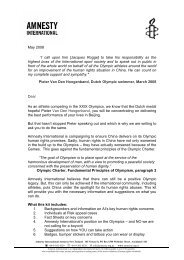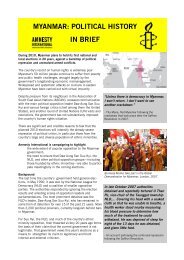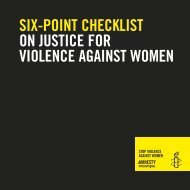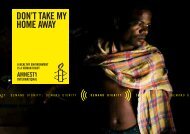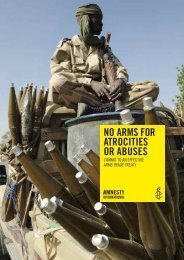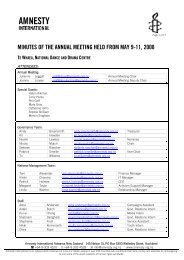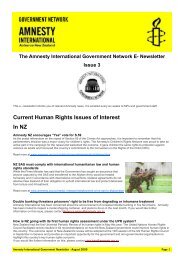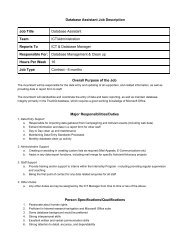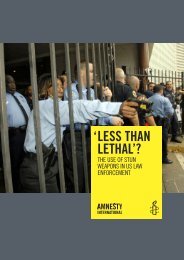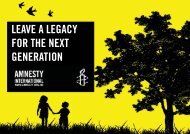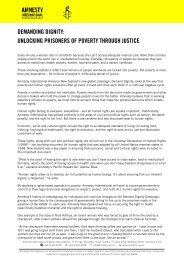Dodging Responsibility - Amnesty International
Dodging Responsibility - Amnesty International
Dodging Responsibility - Amnesty International
Create successful ePaper yourself
Turn your PDF publications into a flip-book with our unique Google optimized e-Paper software.
© Maude Dorr<br />
DODGING RESPONSIBILITY<br />
CORPORATIONS, GOVERNMENTS AND<br />
THE BHOPAL DISASTER<br />
A HEALTHY ENVIRONMENT<br />
IS A HUMAN RIGHT
THOUSANDS OF PEOPLE, MOST OF THEM POOR, WERE KILLED BY A MASSIVE LEAK<br />
OF TOXIC CHEMICALS IN BHOPAL IN 1984. HUNDREDS OF THOUSANDS WERE LEFT ILL<br />
AND FURTHER IMPOVERISHED BECAUSE OF EXPOSURE TO THE FUMES. A QUARTER OF<br />
A CENTURY LATER THE COMMUNITY REMAINS RAVAGED AND IS STILL CAMPAIGNING<br />
FOR JUSTICE. THE DISASTER AND ITS AFTERMATH RAISE FUNDAMENTAL QUESTIONS<br />
ABOUT THE ACCOUNTABILITY AND MORALITY OF THE WORLD’S GIANT CORPORATIONS.<br />
THE DISASTER<br />
Shortly before midnight on 2 December 1984<br />
thousands of tonnes of deadly chemicals<br />
leaked from Union Carbide’s pesticide plant<br />
in Bhopal, central India. Around half a million<br />
people were exposed. Between 7,000 and<br />
10,000 people died in the immediate<br />
aftermath and a further 15,000 over the<br />
next 20 years. Nearly 25 years later, the site<br />
has not been cleaned up, the leak and its<br />
impact have not been properly investigated,<br />
more than 100,000 people continue to<br />
suffer from health problems without the<br />
medical care they need, and survivors are<br />
still awaiting fair compensation and full<br />
redress for their suffering.<br />
DRIVEN DEEPER INTO POVERTY<br />
Most of the people affected by the gas leak<br />
were poor. Many of those who died were<br />
the sole or main wage earner in the family.<br />
Some families also lost their animals – a<br />
key source of income. Thousands of people<br />
lost their jobs or their ability to earn money<br />
because of health problems. Virtually all<br />
those affected by the leak were driven<br />
deeper into poverty.<br />
An out-of-court compensation settlement of<br />
US$470 million was reached between Union<br />
Carbide and the Government of India four<br />
years after the disaster. The Supreme Court<br />
of India upheld the settlement despite being<br />
challenged as inadequate by victims, civil<br />
society groups and others. Even then,<br />
survivors trying to access compensation faced<br />
numerous problems, including corruption,<br />
long delays and denial of appropriate appeal<br />
mechanisms. Not being able to get adequate<br />
and timely compensation continues to affect<br />
people’s ability to recover from the tragedy.<br />
The social stigma of being affected by the gas<br />
has had severe repercussions, particularly for<br />
women. Many became too sick to work and<br />
were perceived as a burden. For those who<br />
were unmarried, the label of “gas-affected”<br />
made marriage unlikely.<br />
Although there were attempts by the<br />
authorities to provide medical services,<br />
support for new businesses, vocational<br />
training and new housing, these schemes<br />
have not amounted to real rehabilitation.<br />
Bhopal is not just a human rights<br />
tragedy from the last century –<br />
it is a human rights travesty today.<br />
The interaction of powerful<br />
corporate interest, legal complexity<br />
and government failures and neglect<br />
has proved a huge obstacle to<br />
justice for the people of Bhopal.<br />
Many people have had to pay for medical<br />
treatment that was meant to be free.<br />
Premises for industrial businesses lie empty<br />
and training centres for women have been<br />
closed. Housing built for victims of the leak,<br />
especially widows, lacks basic sanitation.<br />
The Bhopal disaster shocked the world<br />
and raised fundamental questions about<br />
the accountability of corporations. While<br />
the people of Bhopal have struggled to<br />
obtain even basic relief such as clean<br />
water, the company involved has evaded<br />
accountability and obstructed the efforts<br />
of victims to secure reparation.<br />
CORPORATE NEGLIGENCE<br />
Even before the disaster, there was evidence<br />
of serious failures by Union Carbide at the<br />
Bhopal plant. The company stored a<br />
dangerous substance in bulk without<br />
adequate safety mechanisms. In particular,<br />
the company failed to set up a comprehensive<br />
emergency plan to warn local communities<br />
about leaks, even though it had such a plan<br />
in place in the USA. Such corporate double<br />
standards often place the human rights of the<br />
poor in developing countries at greater risk.<br />
Union Carbide’s response to the Bhopal leak<br />
raised fundamental questions about corporate<br />
responsibility, accountability and ethics. While<br />
thousands were dying in Bhopal as a result<br />
of exposure to approximately 54,000 pounds<br />
of methyl isocyanate (MIC) and 26,000 pounds of<br />
reaction products, company officials denied<br />
that MIC was toxic. To this day Union Carbide<br />
has not named the reaction products that<br />
leaked with the MIC, hampering efforts to treat<br />
victims. This behaviour contrasts with Union<br />
Carbide’s response to a gas leak in West<br />
Virginia, USA, in 1985, following which it<br />
published a detailed list of reaction products.<br />
In the immediate aftermath of the Bhopal<br />
tragedy, Union Carbide provided some support<br />
to relief operations. However, the company also<br />
sought to limit its compensation responsibilities<br />
and walked away from Bhopal without<br />
adequately cleaning up the factory site,<br />
leaving the victims to cope with the pollution.<br />
GOVERNMENT FAILINGS<br />
Under international law all states are obliged to<br />
ensure that companies do not undermine or<br />
violate human rights. Where corporate activity<br />
does harm human rights, the government<br />
A HEALTHY ENVIRONMENT IS A HUMAN RIGHT<br />
<strong>Amnesty</strong> <strong>International</strong> May 2009 Index: ASA 20/002/2009
© <strong>Amnesty</strong> <strong>International</strong><br />
Cover image: The Union Carbide plant<br />
photographed in 2002, almost 20 years<br />
after the gas leak.<br />
This page: Ink and watercolour painting,<br />
by Nepalese artist N.B. Gurung, showing the<br />
ongoing effects of the Bhopal gas leak.<br />
should investigate and ensure appropriate<br />
sanctions and accountability measures are<br />
in place and enforced. The government must<br />
also ensure access to an effective remedy<br />
for the victims. On all fronts the government<br />
of India has failed to respect and protect the<br />
human rights of the people of Bhopal.<br />
THE COMPANIES INVOLVED<br />
In 1984 the Bhopal factory was part of the operations of Union Carbide India Limited (UCIL).<br />
Union Carbide Corporation (UCC) – a US-based company – owned 50.9 per cent of UCIL. UCC<br />
has consistently argued that UCIL is an entirely separate corporate entity. UCC has also<br />
repeatedly claimed in the courts that it was purely a US-based corporation and denies that<br />
it has “operations” in India or elsewhere outside the USA. However, UCC’s 1984 annual report<br />
stated: “Union Carbide Corporation’s business worldwide is conducted principally through<br />
the divisions, subsidiaries and affiliates listed below.” One of those listed was UCIL, which<br />
was also included in UCC’s consolidated balance sheet for the same year.<br />
In 1994 Union Carbide sold its 50.9 per cent share of UCIL to MacLeod Russell (India) Limited<br />
of Calcutta, and UCIL was renamed Eveready Industries India, Limited (Eveready Industries).<br />
Union Carbide stated: “As a result of the sale of its shares in UCIL, Union Carbide retained<br />
no interest in – or liability for – the Bhopal site, and Eveready Industries continued to retain<br />
exclusive possession of the land under lease from the state government of Madhya Pradesh.”<br />
In 1998 Eveready Industries surrendered the lease on the Bhopal factory site to the state<br />
government of Madhya Pradesh – apparently at the request of the state government.<br />
In February 2001 UCC became a wholly owned subsidiary of The Dow Chemical Company (Dow).<br />
Even though Union Carbide continued to be a separate legal entity, its corporate identity and<br />
all of its business is fully integrated with that of Dow. Dow Chemicals has publicly stated that<br />
it has no responsibility for the leak and its consequences or for the pollution from the plant.<br />
Despite the hazardous substances and<br />
processes used at the Bhopal plant, there is<br />
no evidence that the authorities took adequate<br />
steps to assess the risk to local communities<br />
or the environment, or to press Union<br />
Carbide to review safety mechanisms. State<br />
action since the leak has been inadequate;<br />
the compensation agreed was insufficient; the<br />
plant site remains contaminated; and the<br />
government has repeatedly failed to deliver on<br />
promises to the survivors and their families.<br />
WHO DOES THE LAW PROTECT<br />
The Bhopal tragedy provides a stark example<br />
of how the law protects powerful corporations<br />
but often fails the poorest people. Numerous<br />
efforts by campaigners to use the law to obtain<br />
redress and secure accountability have failed.<br />
A criminal case in India continues 25 years<br />
after the tragedy. In December 1991 the<br />
Chief Judicial Magistrate in Bhopal ordered<br />
Warren Anderson, then Chief Executive<br />
Officer of UCC, to appear in court to<br />
face charges of culpable homicide not<br />
amounting to murder in connection with<br />
the gas leak. He did not appear. Efforts<br />
to extradite him from the USA have failed.<br />
A public interest litigation case brought in<br />
2004, seeking clean-up of the site and<br />
other rehabilitation measures, is still before<br />
the Madhya Pradesh High Court. Although<br />
A HEALTHY ENVIRONMENT IS A HUMAN RIGHT<br />
Index: ASA 20/002/2009 <strong>Amnesty</strong> <strong>International</strong> May 2009
© <strong>Amnesty</strong> <strong>International</strong><br />
BHOPAL’S STRUGGLE FOR<br />
JUSTICE<br />
The survivors of Bhopal have fought for 25<br />
years for justice. Their unstinting campaign<br />
for adequate clean-up, compensation and<br />
accountability has seen survivors and supporter<br />
groups, including children and people with<br />
disabilities, repeatedly make the 800-kilometre<br />
march from Bhopal to New Delhi. Activists have<br />
organized rallies, petitions and hunger strikes.<br />
the High Court ordered the government to<br />
clean up the site, the government has not<br />
done so and legal arguments about liability<br />
have dragged on in the courts.<br />
Efforts by the victims to get redress through<br />
the US court system have also failed.<br />
Union Carbide’s legal team first argued that<br />
the Indian courts were a better forum for<br />
the case. The US District Court upheld the<br />
motion to send the Bhopal case to the Indian<br />
courts, on condition that Union Carbide<br />
submit to the jurisdiction of the Indian<br />
courts. Union Carbide appealed against<br />
Bhopal survivors and supporters marching to<br />
New Delhi, 2006.<br />
the condition. In a complete about-turn, the<br />
company then claimed in the appeals court<br />
that: “Indian courts, while providing an<br />
adequate forum, do not observe due process<br />
standards that would be required as a matter<br />
of course in this country.”<br />
The Bhopal disaster highlights how the law<br />
can be used by companies to protect their<br />
interests, and significantly disadvantages<br />
victims of those companies, particularly<br />
when transnational corporations are<br />
involved. Laws and systems that protect<br />
human rights need to evolve to deal more<br />
effectively with the realities of a globalized<br />
economy in which powerful transnational<br />
actors operate across state boundaries.<br />
<strong>Amnesty</strong> <strong>International</strong> supports the campaign<br />
for justice in Bhopal and its members will<br />
continue to join survivors and activists to<br />
demand justice, accountability and an end<br />
to 25 years of human rights violations.<br />
TAKE ACTION NOW<br />
<strong>Amnesty</strong> <strong>International</strong> is calling for:<br />
The full establishment of the promised<br />
Empowered Commission on Bhopal by<br />
the Government of India, with adequate<br />
resources and capacity.<br />
Adequate measures to address the<br />
long-term impacts of the Bhopal gas leak<br />
including proper clean-up and remediation<br />
of the factory site, medical care, regular<br />
supply of adequate safe water for the<br />
affected communities, and economic<br />
rehabilitation.<br />
Urgent and decisive action by<br />
the Government of India to address the<br />
outstanding problems of compensation<br />
and accountability.<br />
All states to adopt stronger legal<br />
and policy frameworks at the national and<br />
international levels to hold corporations to<br />
account for their abuse of human rights.<br />
DEMANDDIGNITY.AMNESTY.ORG<br />
A HEALTHY ENVIRONMENT<br />
IS A HUMAN RIGHT<br />
<strong>Amnesty</strong> <strong>International</strong> is a global movement of 2.2 million people in more<br />
than 150 countries and territories who campaign to end grave abuses of<br />
human rights.<br />
Our vision is for every person to enjoy all the rights enshrined in the<br />
Universal Declaration of Human Rights and other international human<br />
rights standards.<br />
We are independent of any government, political ideology, economic interest<br />
or religion – funded mainly by our membership and public donations.<br />
May 2009<br />
Index: ASA 20/002/2009<br />
<strong>Amnesty</strong> <strong>International</strong><br />
<strong>International</strong> Secretariat<br />
Peter Benenson House<br />
1 Easton Street<br />
London WC1X 0DW<br />
United Kingdom<br />
www.amnesty.org



